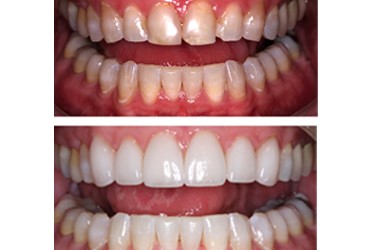All About Veneers

1. What Are Veneers?
Veneers are thin coverings applied to the outer surface of the teeth to improve their appearance. Many people opt for veneers to address a range of cosmetic dental issues, such as gaps, chips, cracks, stains, unevenness, discoloration, and misalignment. You may choose to get veneers on just one or two teeth or several more—typically the top front row of teeth, as they are most visible.
2. Types of Veneers
Veneers may be made from porcelain or a resin-based composite material. Each type of veneer comes with benefits and drawbacks.
Porcelain Veneers
Porcelain veneers are custom-made, thin shells attached to the front of your teeth. Porcelain veneers are less invasive than crowns.
They are durable, natural-looking, sturdy, stain-resistant, and long-lasting coverings once the proper occlusion is acheived.
Resin-Based Composite Veneers
Resin-based composite veneers are attached to the front of your teeth with a tooth-colored bonding agent.
Compared to porcelain veneers, composite veneers don’t require as much reshaping of the tooth. The procedure may be completed in a single visit to the dentist in some cases. They are also usually less expensive. However, composite veneers aren’t as sturdy or long lasting as porcelain veneers. They’re also easier to stain over time. They may not be as effective in treating more severe cosmetic dental issues.
3. How Much Do Veneers Cost?
According to the American Dental Association, veneers typically cost between $925 and $2,000 per tooth.
The cost of veneers also varies according to your location, the cosmetic dentist you select, the number of teeth you choose to treat, and the number of visits it takes to complete your procedure. Dental insurance generally does not cover veneers or any other cosmetic dentistry.
4. How Long Do Veneers Last?
Typically, porcelain veneers last around 10 to 15 years. However, with excellent aftercare and maintenance, they may last 20 years or more. In one study, 91% of patients with porcelain veneers still had them after 20 years.
Composite veneers are not quite as durable. They last around two to five years on average. Most of these composite Veneers start showing staining around their margins.
After your veneers begin to show signs of wear and tear, such as detaching from the bonding agent, you may have to schedule a replacement procedure.
5. How Do Veneers Work?
To prepare you for porcelain veneers, your dentist will typically start by removing a small amount of enamel (the outer covering of the tooth) from the front and/or sides of your natural teeth. some dentists prefer to only roughen the surface of your tooth to preserve maximum tooth structure. Tooth reshaping allows your veneers to fit more comfortably and achieve a more natural-looking appearance in your mouth.
After your enamel reduction, your dentist will create a mold of your teeth. The mold will be sent off to a dental lab to create a custom set of veneers that can then be fitted, bonded, polished, and adjusted.
No-Prep Veneers
Some no-preparation and minimal-preparation porcelain veneers are paper-thin and don’t require as much (or any) tooth reshaping. However, not everyone is a candidate for these newer procedures. Your tooth enamel must already be in great shape for this option. Also you must have a balanced bite, void of any traumatic occlusion to prevent the veneers from dislodging.
6. What is the Procedure for Veneers Treatment.
Before getting veneers, you should practice good oral hygiene and ensure your teeth are ready for the procedure. Your dentist should treat any underlying gum or dental concerns before you proceed. Getting porcelain veneers usually takes about two to three visits.
Here's what to expect for Veneers Treatment:
Consultation: You will discuss your dental concerns with your dental care provider and select your preferred tooth color and shape at your consultation. Your visit will also likely include a thorough dental examination and X-ray imaging. Your cost of the treatment will be discussed at this visit.
Tooth preparation and molding: At your next visit, your dentist will use a local anesthetic while they reshape your teeth, remove a small amount of enamel, and make a mold of your teeth to send off to a dental lab. You will be given temporary veneers to wear until your next visit.
Placement and adjustment: At your third visit, your dentist will bond your new veneers to your natural teeth. They will finish up by polishing and adjusting them as necessary. You may have to return for follow-up appointments to ensure that your veneers are placed correctly.
The process for resin-based composite veneers is often shorter and less complex than with porcelain. After your teeth are prepared, your dentist will shape and harden the composite material and bond it to your teeth.
7. Veneers Aftercare
Taking care of your veneers is key to maintaining their appearance over time.
Soon after your procedure, your dentist may recommend that you temporarily stop drinking red wine or coffee to avoid stains. It’s also best to avoid extremely hot or cold foods and beverages, as your teeth may be sensitive at first.
Here are some other veneer aftercare tips:
Brush and floss regularly to avoid getting cavities under your veneers.
Wear a mouth guard to avoid grinding your teeth (bruxism), which can wear away your veneers over time.
Tell your dentist if you feel that your veneers are starting to decay or separate from your natural tooth.
See your dentist for regular cleanings and follow-up appointments.
Avoid chewing on items that may damage your veneers, such as hard candy, pencils, pens, or ice. Avoid biting your nails.